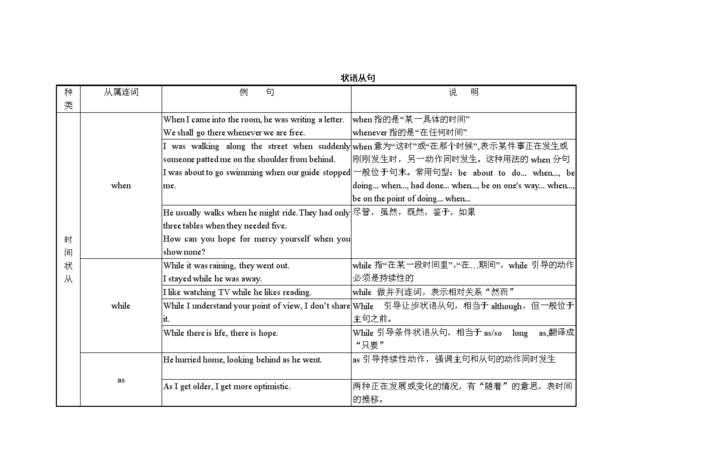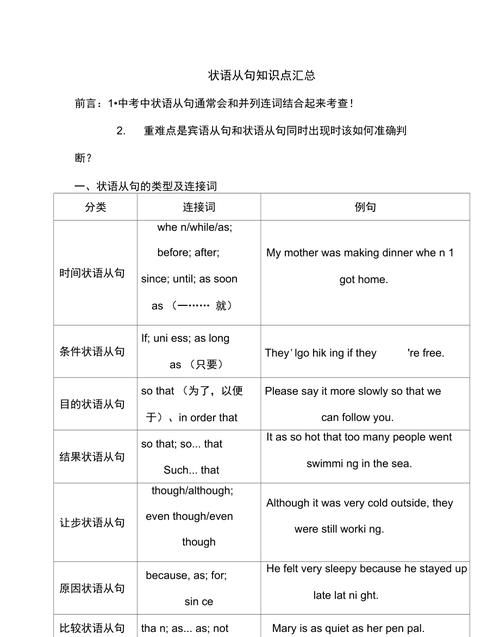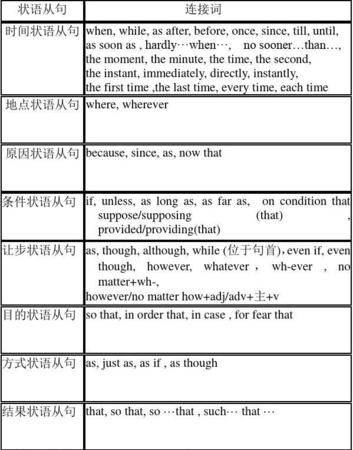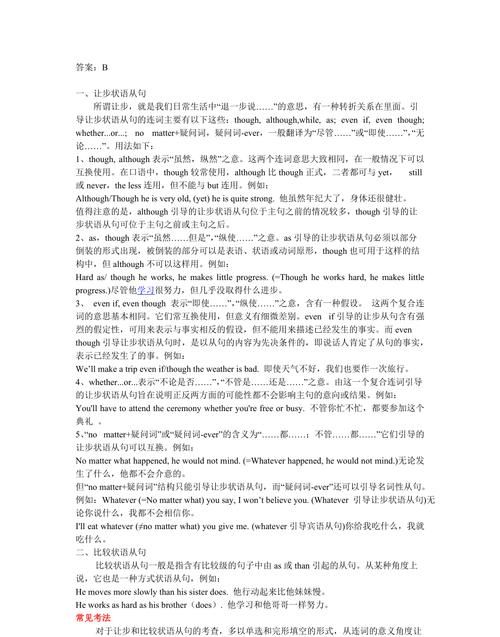本文目录
高二英语语法知识点总结
习英语语法是一样繁琐的事,对于处于懒散状态的高二学生来说,更加不想要去背和接触,下面给大家带来一些关于 高二英语 语法必考知识点 总结 ,希望对大家有所帮助。
高二英语语法必考知识点总结1
主谓一致
1、以单数名词或代词、动词不定式 短语 作主语时,谓语动词要用单数;主语为复数时,谓语用复数。(最基本的)
2、由and或both……and连接的并列成分作主语时,谓语动词用复数。
但并列主语如果指的是同一人、同一事物或同一概念,谓语动词用单数。
3、由and连接的并列单数主语之前如果分别由each, every, no修饰时,其谓语动词要用单数形式。
4、主语是单数时,尽管后面跟有 but ,except, besides, with ,as well as ,together with ,along with,like 等引导的介词短语时 ,谓语动词与前面的主语一致。
注意:主语和谓语之间插入了分词短语,谓语要与主语保持一致。
5、一些只有复数形式的名词,如people, police, cattle, clothes等作主语时,谓语动词要用复数。
6、集体名词family, class, team, group 等看作整体时,谓语动词用单数;看作每一个成员时,谓语动词用复数。
7、 当表示国家,城市,人名,书名,报纸,杂志,及组织机构等的专有名词做主语时,作为整体,谓语动词用单数形式。
The New York Times is reading all over the United States . 《纽约时报》
8、 news ,maths,physics ,politics等词貌似复数,实为单数,其谓语动词用单数.
9、“the +形容词”(如the poor ,the rich ,the young, the old , the dead ,the sick,the brave 等)作主语,谓语动词往往用复数
10、表时间、距离、价格、度量衡等的名词作主语时,谓语动词通常用单数。
11、由连词not……but……, or, either……or, neither……nor, not only…but also,等连接的并列主语,如果一个是单数,一个是复数,则谓语动词按就近一致原则,与最靠近它的主语一致。(这个就是就近原则)
12、There be句型、以here开头的 句子 谓语动词和靠近的主语一致。
13、a number of后面加复数名词或代词,其动词用复数形式;但the number of后面加复数名词或代词时,其谓语用单数。
14、在定语从句中主语是关系代词who , that , which , 谓语动词的数应与先行词的数一致。
注意在“one of +复数名词+ who/that/which”引导的定语从句中,从句谓语的单复数取决 于one前是否有the (only)、the very。如果有,从句的谓语动词用单数,如没有the only, 就用复数形式。
高二英语语法必考知识点总结2
省略
Ⅰ、状语从句中的省略用法
以if从句为代表的状语从句中的特殊省略用法:通常省略了it is,that is,there is/are。
Ⅱ、定语从句中的省略用法
关系词的省略 关系代词that,which,whom等在限制性定语从句中充当宾语且不位于介词之后时,可以省略;in which或that在先行词way后作方式状语从句时可省略。
Ⅲ、虚拟语气中if及should的省略
1、 当条件状语从句中有were,had,should等时省略if,把它们提至句首,形成倒装句。
2、 Suggest,insist,order,require等表示建议、要求、命令的动词后接的名词性从句中,谓语动词常用“should+动词原形”,should可以省略。
Ⅳ、不定式符号to的省略
1、 感官动词see,hear,feel,watch等和使役动词have,make,let等后接不定式作宾语时,不定式省略to。
2、 在特定语境中为了避免重复,当不定式再次出现时,在want,wish,hope,try,plan,like,love,hate后往往只保留to,而省略后面的动词。但不定式后有be,have时,也保留be和have。
Ⅴ、So和not的替代性省略
用于避免重复前面所说过的内容,替代词so/not替代肯定或否定的名词性从句。可与believe,do,expect,fear,guess,hope,say,speak,suppose,think,I’m afraid等连用
高二英语语法必考知识点总结3
倒装
1.在there be/live/lie句型中用全部倒装:
2.在以there, here, now, then +be/come/go+主语的句子中用全部倒装:
注:如果主语是代词则不用倒装。
3.以off, away, out, in, up, down等副词开头的句子以示强调或为了使情景更生动,句子用全部倒装:
注:如果主语是代词则不用倒装。
4. only, not until所修饰的介词短语、副词或状语从句放在句首时,要部分倒装:
注:①主句倒装,从句不倒装。
②Only+主语置于句首时,不倒装。
5. never, hardly, seldom, scarcely, barely, not, few, little, often, by no means, at no time等放在句首时,要部分倒装:
6.在no sooner…than; not only…but also; hardly/scarcely …when; 句型中,前面的句子要部分倒装:
注:not only…but also, neither…nor连接两个主语不倒装。
7.以so, neither, nor开头的句子,表相同概念的肯定或否定时,要全部倒装:
e.g.:
I have never been to Beijing. Nor has he.
She is a teacher, so am I.
8.so/such…that句型中,把so/such修饰的那部分放在句首时,主句要部分倒装:
9.as引导的让步状语从句,常把表语、状语置于主首,用倒装:
注:如果表语是单数可数名词,该词前一般不加冠词。
Child as he is, he knows a lot.
10.省略if的虚拟条件句置于句首时,用倒装:
11. Such作表语放在句首时,表示强调,用倒装:
12. 为了保持句子平衡,或使上下文连接更紧,可把介词短语、形容词短语、副词或分词提到主语前,用全部倒装语序:
高二英语语法必考知识点总结4
过去分词与现在分词
一、现在分词和过去分词的构成(形式)
现在分词的构成
主动语态 被动语态
一般式 doing being done
完成式 having done having been done
过去分词的构成:done
二、过去分词的用法
过去分词一般表示完成的和被动的动作,只有一种形式。
过去分词用法如下:
1.作定语:和现在分词作定语的用法相同。作定语用的过去分词如果是单词,一般放在名词的前面;如果是过去分词短语,要放在名词的后面。
2.作表语
3.作宾语补足语
4.作状语
三、现在分词的用法
1. 作定语 作定语用的分词如果是单词,一般放在名词的前面。如果是分词短语,一般放在名词的后面,它的功用相当于定语从句。
2. 作表语
3. 作宾语补足语 分词在复合宾语中可作宾语补足语。可带这种复合宾语的动词有:see, watch, hear, feel, find, get, keep等。
注1:上述句子也可以变为被动式。如:Steam can be seen rising from the wet clothes. 2:复合宾语中用现在分词和用不定式意义稍有不同。不定式表示动作发生了,指事物的全过程;分词则表示动作正在进行。
高二英语语法必考知识点总结相关 文章 :
★ 高中英语语法知识点整理总结
★ 高中英语语法考点总结
★ 高二英语语法知识点
★ 高二英语语法知识要点
★ 高二英语语法总结
★ 高中必备英语知识点归纳
★ 高中英语语法知识点
★ 高考英语必考语法知识点汇总
★ 2020高考英语必考语法知识点汇总
★ 高中英语语法总结

高中英语语法倒装句知识点总结
相关例句
时间状语从句
常用引导词:when, as, while, as soon as, before, after, since , not...until
特殊引导词:the minute, the moment, the second, every time, the day,the instant( 瞬间,顷刻), immediately , directly(不久,立即), no sooner … than(一...就...), hardly …when(刚一...就...) , scarcely … when(几乎没有……的时候)
I didn’t realize how special my mother was until I became an adult.
直到我成为了一个成年人我才意识到我的母亲是多么的特殊。
While John was watching TV, his wife was cooking.
当约翰在看电视时,他的妻子正在做饭。
The children ran away from the orchard(果园), the moment they saw the guard.
孩子们一看到守卫就逃走了。
No sooner had I arrived home than it began to rain.
还没等我到家就开始下雨了。
Every time I listen to your advice, I get into trouble.
每当我听取你的建议的.时候,我就会惹上麻烦。
地点状语从句
常用引导词:where
特殊引导词:wherever, anywhere, everywhere
Generally, air will be heavily polluted where there are factories.
一般来说,有工厂的地方空气污染就严重
Wherever you go, you should work hard.
无论你去哪里,你应该努力工作
地点状语从句一般由连接副词where, wherever等引导,已经形成了固定的句型,例如:
Where there is no rain, farming is difficult or impossible.
在没有雨水的地方,耕作是困难的,或根本不可能的。
They were good persons. Where they went, there they were warmly welcomed.
他们都是好人。因此他们走到哪里都受到热烈欢迎。
You should have put the book where you found it.
你本来应该把书放回原来的地方。
Where the Communist Party of China goes, there the people are liberated.
哪里有了中国共产党,哪里人民就得解放。
Wherever the sea is , you will find seamen.
有海就有海员。
原因状语从句
常用引导词:because, since, as, for
特殊引导词:seeing that, now that, in that, considering that, given that.
My friends dislike me because I’m handsome and successful.
我的朋友不喜欢我,因为我又英俊又成功。
Now that everybody has come, let’s begin our conference.
既然每个人都到了,让我们开始我们的会议吧。
The higher income tax is harmful in that it may discourage people from trying to earn more.
更高的收入税是有害的,因为它或许会阻碍人们努力赚钱。
目的状语从句
常用引导词:so that, in order that
特殊引导词:lest, in case, for fear that,in the hope that, for the purpose that, to the end that
The boss asked the secretary to hurry up with the letters so that he could sign them.
老板要求秘书快写函件以便他能在上面签字。
The teacher raised his voice on purpose that the students in the back could hear more clearly.
为了让后面的学生听得更清楚,老师有意地提高了他的声音。
结果状语从句
常用引导词:so … that, such … that,
特殊引导词:such that, to the degree that, to the extent that, to such a degree that,
He got up so early that he caught the first bus.
他很早起床以便赶上第一班公共汽车
It’s such a good chance that we must not miss it.
这是一个好机会,千万不能错过它
To such a degree was he excited that he couldn’t sleep last night.
他激动到这个程度,以至于他昨晚睡不着
条件状语从句
常用引导词:if, unless,whether(whether...or not)
特殊引导词:as/so long as, only if, providing/provided that, supposing that, in case that, on condition that
We’ll start our project if the president agrees.
如果总统同意,我们将开始我们的项目
You will certainly succeed so long as you keep on trying.
你一定会成功,只要你继续努力
Provided that there is no opposition, we shall hold the meeting here.
如果没有人反对,我们就在这里开会
让步状语从句
常用引导词:though, although, even if, even though
特殊引导词: as(用在让步状语从句中必须要倒装),while ( 一般用在句首 ),no matter …, in spite of the fact that, whatever, whoever, wherever, whenever, however, whichever
Much as I respect him, I can’t agree to his proposal.
尽管我很尊敬他, 我却不同意他的建议。
The old man always enjoys swimming even though the weather is rough.
老人喜欢游泳,即使天气很恶劣
No matter how hard he tried, she could not change her mind.
不论他如何努力,她不会改变她的主意
He won’t listen whatever you may say.
他不会听你说什么
比较状语从句
常用引导词:as(同级比较), than(不同程度的比较)
特殊引导词:the more … the more … ; just as …, so…; A to B is what/as X is to Y; no … more than; not so much A as B
She is as bad-tempered as her mother.
她和她妈妈一样脾气很坏
The house is three times as big as ours.
这房子是我们的三倍大
The more you exercise, the healthier you will be.
你运动的越多,你就越健康
Food is to men what oil is to machine.
食物之于人,犹如油之于机器。
方式状语从句
常用引导词:as, as if, how
特殊引导词:the way
When in Rome, do as the Roman do.
入国问禁,入乡随俗
She behaved as if she were the boss.
她表现得就好像她是老板
Sometimes we teach our children the way our parents have taught us.
有时,我们用父母教导我们的方式教导我们的孩子

专升本英语语法知识点汇总
状语从句 (Adverbial Clause) 是指 句子 用作状语时,起副词作用的句子。状语从句中的从句可以修饰谓语、非谓语动词、定语、状语或整个句子。下面就是我给大家带来的状语从句英语语法知识点汇总,希望大家喜欢!
1 地点状语从句
地点状语从句通常由where, wherever 引导。
Where I live there are plenty of trees.
我住的地方树很多。
Wherever I am I will be thinking of you.
不管我在哪里我都会想到你。
2 方式状语从句
方式状语从句通常由as, (just) as…so…, as if, as though引导。
1) as, (just) as…so…引导的方式状语从句通常位于主句后,但在(just) as…so…结构中位于句首,这时as从句带有比喻的含义,意思是"正如…","就像",多用于正式文体,例如:
Always do to the others as you would be done by.
你希望人家怎样待你,你就要怎样待人。
As water is to fish, so air is to man.
我们离不开空气,犹如鱼儿离不开水。
Just as we sweep our rooms, so we should sweep backward ideas from our minds.
正如打扫房屋一样,我们也要扫除我们头脑中落后的东西。
2) as if, as though
两者的意义和用法相同,引出的状语从句谓语多用虚拟语气,表示与事实相反,有时也用陈述语气,表示所说情况是事实或实现的可能性较大。汉译常作"仿佛……似的","好像……似的",例如:
They completely ignore these facts as if (as though) they never existed.
他们完全忽略了这些事实,就仿佛它不存在似的。(与事实相反,谓语用虚拟语气。)
He looks as if (as though) he had been hit by lighting.
他那样子就像被雷击了似的。(与事实相反,谓语用虚拟语气。)
It looks as if the weather may pick up very soon.
看来天气很快就会好起来。(实现的可能性较大,谓语用陈述语气。)
说明:as if / as though也可以引导一个分词 短语 、不定式短语或无动词短语,例如:
He stared at me as if seeing me for first time.
他目不转睛地看着我,就像第一次看见我似的。
He cleared his throat as if to say something.
他清了清嗓子,像要说什么似的。
The waves dashed on the rocks as if in anger.
波涛冲击着岩石,好像很愤怒。
3 原因状语从句
比较:because, since, as和for
1) because语势最强,用来说明人所不知的原因,回答why提出的问题。当原因是显而易见的或已为人们所知,就用as或 since。
I didn't go, because I was afraid.
Since /As the weather is so bad, we have to delay our journey.
2) 由because引导的从句如果放在句末,且前面有逗 号,则可以用for来代替。但如果不是说明直接原因,而是多种情况加以推断,就只能用for。
He is absent today, because / for he is ill.
He must be ill, for he is absent today.
4 目的状语从句
表示目的状语的从句可以由that, so that, in order that, lest, for fear that, in case等词引导,例如:
You must speak louder so that /in order that you can be heard by all.
He wrote the name down for fear that(lest) he should forget it.
Better take more clothes in case the weather is cold.
5 结果状语从句
结果状语从句常由so… that 或 such…that引导,掌握这两个句型,首先要了解so 和 such与其后的词的搭配规律。
比较:so和 such
其规律由so与such的不同词性决定。such 是形容词,修饰名词或名词词组,so 是副词,只能修饰形容词或副词。 so 还可与表示数量的形容词many, few, much, little连用,形成固定搭配。
so foolish such a fool
so nice a flower such a nice flower
so many / few flowers such nice flowers
so much / little money. such rapid progress
so many people such a lot of people
( so many 已成固定搭配,a lot of 虽相当于 many,但 a lot of 为名词性的,只能用such搭配。)
so…that与such…that之间的转换既为 so与such之间的转换。
The boy is so young that he can't go to school.
He is such a young boy that he can't go to school
6 条件状语从句
连接词主要有 if, unless, as/so long as, on condition that 等。.
if 引导的条件句有真实条件句和非真实条件句两种。非真实条件句已在虚拟语气中阐述。
unless = if not.
Let's go out for a walk unless you are too tired.
If you are not too tied, let's go out for a walk.
典型例题
You will be late ___ you leave immediately.
A. unless B. until C. if D. or
答案A。 句意:除非你立即走,否则你就回迟到的。可转化为 If you dong leave immediately, you will be late. B、D句意不对,or表转折,句子如为 You leave immediately or you will be late.
7 让步状语从句
though, although
注意: 当有though, although时,后面的从句不能有but,但是 though 和yet可连用
Although it's raining, they are still working in the field.
虽然在下雨,但他们仍在地里干活。
He is very old, but he still works very hard.
虽然他很老,但仍然努力地工作。
Though the sore be healed, yet a scar may remain.
伤口虽愈合,但伤疤留下了。 ( 谚语 )
典型例题
1) ___she is young, she knows quite a lot.
A. When B. However C. Although D. Unless
答案:C。意为虽然她很年轻,却知道许多。
2) as, though 引导的倒装句
as / though引导的让步从句必须表语或状语提前(形容词、副词、分词、实义动词提前)。
Child as /though he was, he knew what was the right thing to do.
= Though he was a small child, he knew what was the right thing to do.
注意: a. 句首名词不能带任何冠词。
b. 句首是实义动词,其他助动词放在主语后。如果实义动词有宾语和状语,随实义动词一起放在主语之前。
Try hard as he will, he never seems able to do the work satisfactorily.
= Though he tries hard, he never seems…
虽然他尽了努力,但他的工作总做的不尽人意。
3) ever if, even though. 即使
We'll make a trip even though the weather is bad.
4) whether…or- 不管……都
Whether you believe it or not, it is true.
5) "no matter +疑问词" 或"疑问词+后缀ever"
No matter what happened, he would not mind.
Whatever happened, he would not mind.
替换:no matter what = whatever
no matter who = whoever
no matter when = whenever
no matter where = wherever
no matter which = whichever
no matter how = however
注意:no matter 不能引导主语从句和宾语从句。
(错)No matter what you say is of no use now.
(对)Whatever you say is of no use now.
你现在说什么也没用了。(Whatever you say是主语从句)
(错)Prisoners have to eat no matter what they're given,
(对)Prisoners have to eat whatever they're given. 囚犯们只能给什么吃什么。
8 比较while, when, as
1)as, when 引导短暂性动作的动词。
Just as / Just when / When I stopped my car, a man came up to me.
2)当从句的动作发生于主句动作之前,只能用when 引导这个从句,不可用as 或 while。
When you have finished your work, you may have a rest.
3)从句表示"随时间推移"连词能用as,不用when 或while。
As the day went on, the weather got worse.
日子一天天过去,天气越变越坏。
9 比较until和till
此两个连词意义相同。肯定形式表示的意思是"做某事直至某时",动词必须是延续性的。否定形式表达的意思是"直至某时才做某事"。动词为延续性或非延续性都可 以。 正确使用这两个连词的关键之一就在于判断句中的动词该用肯定式还是否定式。
肯定句:
I slept until midnight. 我一直睡到半夜时醒了。
Wait till I call you. 等着我叫你。
(在肯定句中可用before代替 Let's get in the wheat before the sun sets.)
否定句:
She didn't arrive until 6 o'clock.
她直到6点才到。
Don't get off the bus until it has stopped.
公共汽车停稳后再下车。
I didn't manage to do it until you had explained how. 直到你教我后,我才会做。
1)Until可用于句首,而till通常不用于句首。
Until you told me, I had heard nothing of what happened.
直到你告诉我以前,出了什么事我一点也不知道。
2)Until when 疑问句中,until要放在句首。
---Until when are you staying? 你呆到什么时候?
--- Until next Monday. 呆到下周一。
注意:否定句可用另外两种句式表示。
(1)Not until …在句首,主句用倒装。
Not until the early years of the 19th century did man know what heat is.
直到19 世纪初,人类才知道热能是什么。
Not until I began to work did I realize how much time I had wasted.
直到我开始工作,我才认识到了我已蹉跎了几多岁月。
(2) It is not until… that…
10 表示"一…就…"的结构
hardly/scarcely…when/before, no sooner…than 和as soon as都可以表示"一…就…"的意思,例:
I had hardly / scarcely got home when it began to rain.
I had no sooner got home than it began to rain.
As soon as I got home, it began to rain.
注意:如果hardly, scarcely 或no sooner置于句首,句子必须用倒装结构:
Hardly / Scarcely had I got home when it began to rain.
No sooner had I got home than it began to rain.
状语从句英语语法知识点汇总相关 文章 :
1. 最新九年级英语语法知识点总结大全
2. 初二英语语法知识点汇总
3. 高中英语语法知识点整理总结
4. 初一英语学习方法指导与学习方法总结
5. 复习中考英语知识点归纳
6. 英语语法大全总结
7. 初中英语语法知识点总结
8. 英语高一必修一语法知识点汇总
9. 英语语法总结大全
10. 初中英语语法 状语从句

初中英语从句知识点总结
要想在成考英语考试中脱颖而出,首先还得对相应的从句进行复习。下面是我为大家整理的关于英语从句知识点 总结 ,希望对您有所帮助。欢迎大家阅读参考学习!
高考英语从句复习资料
1.状语从句的时态
(1)当主句是一般将来时时,在时间、条件、让步等状语从句中用一般现在时表示将来的时间。
(2)when, before, after引导的从句的动作与主句动作的先后关系:若主从句的动作先后发生在过去,通常先发生的动作用过去完成时表示,后发生的动作用一般过去时。before, after本身已能表达动作的先后关系,所以在含有before, after从句的 句子 中,主从句的动作都可用一般过去时。
2.状语从句的语气 (见虚拟语气)
(1)as if /as though引导的从句以及if only.。.(但愿,要是……就好了)句子的虚拟情况:用一般过去时表示对现在的虚拟,用过去完成时表示对过去的虚拟。
(2)if引导的非真实条件句中的虚拟情况。
3.状语从句的成分省略
在时间、条件、原因、让步、方式等状语从句中,当从句的主语与主句的主语相同,且从句中含有be动词时,我们可将从句的主语(或作主语的代词it)连同be动词一起省略。
4.状语从句的强调
not until引导的时间状语从句和because引导的原因状语从句可用于强调句型。句型构成分别是:"It was not until ... that ..."和"It is/was because ... that..."。
高考 英语 作文 写作指导
引言 introduction
正文 body
结束语 conclusion
引言 introduction
1. When you are waiting in front of a theatre or at the train terminals, you will realize how important punctuality is. Punctuality is really a virtue, especially in a busy city like Shanghai. Perhaps if everybody were punctual, there would be less suffering and sorrow.
正文 body
2. Punctuality is the main constituent of good character. A person, who is always in time for his appointment, shows real consideration for others. On the other hand, a person who is always late shows his selfishness and thoughtlessness and he is not worthy to be friend with.
constituent 构成
selfishness 自私
3. Some people often say that they cannot always be punctual since traffic is so heavy these days. I think traffic congestion cannot be an excuse for being late. As everybody knows that we might meet an unexpected congestion on the roads, we should leave a bit earlier for the appointment to ensure that we would not be late.
traffic congestion 交通堵塞
4. Some people always have a lot of excuses for coming late. When they finally arrive, they keep on saying sorry to their friends and then explain. The excuse is not always traffic congestion, sometimes they complain that they have met a friend on the road or have helped a blind man to cross the road. Some also like to blame their watches, the clocks at home or in the office. To such people, we cannot help but say sorry that we have come too early.
keep on doing sth. 一直做某事
5. Yet after all such smart fellows will soon find that gradually their friends become fewer and fewer. Perhaps at that time, they would realize how important punctuality is.
结束语 conclusion
6. To be or not to be punctual is a habit. So when we are young, we should try to be punctual every time and never be late for it is much more easily acquired in youth than when we are older.
The person I shall never forget
The person I shall never forget is Qingfengxiang. She is the best friend in my life.
She often listens to me when my mood is bad. Moreover, she usually gives me some advices if I need help. Sometimes, she lends money to me if I want to buy some new clothes.
I will never forget her help even though I already left Wuhan city. I think that she will be one of the most important person during my life. I hope that the friendship of us will keep forever.
修改后
I will never forget her help even though I have already left Wuhan city. I think that she will be one of the most important persons in my life. I hope that the friendship of us will keep forever.
修改后
She often listens to me when I'm in a bad mood. Moreover, she usually gives me some advices if I need help. Sometimes, she lends money to me if I want to buy some new clothes.
Why We Learn English
English is an international language now. Everyone needs to know English.
When we will visit a great number of different places in the word, we need to talk about local person with English. We are interesting in books, otherwise nowadays many of the valuable books are written in English or translated into English. We in order to go through ones, so we should have a good command of English.
We should try our best to learn the English language well.
修改后
When we visit a great number of different places in the world, we need to talk about a local person in English. Nowadays many of the valuable books are written in English or translated into English, so if we are interested in books, we should have a good command of English.
修改后
We should try our best to learn English well.
专升本英语作文考试中,语法一定要简明扼要,而且要正确。
高考英语 作文指导
文章 开端的常见写法
1. 背景法:说明事件发生的时间、地点、情景等背景。如:
I was once spending the month of 1982 in a small seaside village in the south of China. It is a wonderful place quiet and not fashionable. People usually do not go there.
2. 人物法:交代文章所要描述的主要人物或有关人物。如:
Once upon a time there was an honest old fellow named Hans. He had a kind heart and a funny, round, good humoured face. He lived in a tiny cottage all alone, and every day he worked in his garden.
alone 独自一人
lonely 孤独的
3. 主题句法:提出一个观点或论据作为文章要阐明和论述的主题。如:
One of the most notable phases of the industrial revolution was the rapid growth of cities --the shifting of population from rural districts to the urban centers.
rural 乡村的unban 城市的
4. 问题法:用提出问题的 方法 来引出文章的内容,以吸引读者的注意力。如:
What is the nature of the scientific attitude, the attitude of the man who studies and applies physics, chemistry, medicine, engineering or any other science?
5. 惊语法:用令人感到惊奇的句子开头,激起读者的兴趣。如:
A 39-storeyed building in construction collapsed in the city yesterday.
6. 故事 法:以讲述一段故事作为引子,在此基础上展开故事情节。如:
I was spending the night in my aunt's villa one summer. That night, being on a strange bed and feeling excited prevented me from sleeping. I slipped out of bed and went to the bathroom. Suddenly, a strange noise coming from behind made me spin around.
villa 别墅
prevent sb. from doing sth. 阻止某人做某事
spin around 使人头晕目眩
7. 数据法:引用已经证实的某些统计数字来引起话题。如:
The fact that less than 5% of the British population graduate from universities may seem surprising, especially when compared with the American percentage of over 30%
8. 引语法:摘录或引用某些名人的 名言 或常见的习语、 谚语 ,作为文章的开端。如:
Happiness is very important to our life. Shakespeare said, "One who is unhappy can never get a beneficial result."
be important to
9. 定义法:常见于对标题下定义,然后通过举例,逻辑推理等方法加以详细说明。如:
A true good student is one who possesses good morality, sound health, perfect knowledge and various abilities.
morality 道德品质
sound adj.健康的

以上就是关于高中状语从句知识点总结,高二英语语法知识点总结的全部内容,以及高中状语从句知识点总结 的相关内容,希望能够帮到您。

